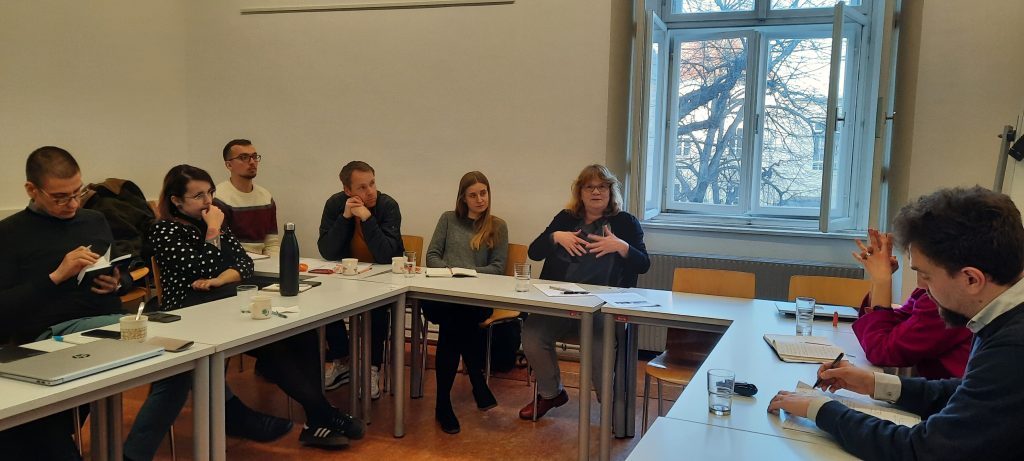March 17th, 2023, 14‒19:30 h
Department of African Studies
Seminarraum 2
Hof 5.1
Spitalgasse 2, 1090 Wien
Organizers:
FWF Project: A Socialist Workplace in Postcolonial Africa: A Connected History of the Yugoslav
Workforce in Zambia (Research platform “Transformations and Eastern Europe”)
Research Team: Goran Musić, Immanuel Harisch, Rory Archer and Anna Calori (for further details, contact: goran.music@univie.ac.at)
Program:
14:00 ‒15:30 Approaching Yugoslav Workplaces in Africa. An introduction to the project and current research considerations, Goran Musić/Immanuel Harisch
15:30‒15:45 Coffee Break
15:45‒17:15 Joint Discussion
17:15‒17:45 Coffee Break
17:45‒19:15 Partnerships and Pitfalls: Lessons from Digitising the Mineworkers´ Union of
Zambia Archive, Duncan Money
19:30 Dinner

Workshop Description:
In Cold War Southern Africa, the promise of modernity was entangled with competing development
models and the global politics of race. On the micro-level, these overarching ideological struggles and
dilemmas were made tangible in a myriad of newly created construction projects, workplaces, and living
settlements. In these new spatial arrangements of life, work, and the surrounding infrastructure,
government officials, companies, and the local populations transformed (post)colonial societies through
everyday negotiations over labor relations, living conditions, and class, racial, ethnic, and gender
hierarchies. The proliferation of development aid and superpower rivalry in international politics made
such projects grow in number and importance. Furthermore, by connecting their well-being to these sites
of developmental policies, men and women (locals and settlers) engaged in geographic and social
mobility acquiring new life expectations and outlooks.
A number of recent research projects at the University of Vienna seek to study local transformations,
connections, and mobilities in Southern Africa from a global perspective. This workshop brings together
researchers from different disciplinary backgrounds, from Austria, Italy, Croatia, Serbia and Uganda to
discuss their theoretical and methodological approaches, identify overlapping research themes and think
about joint institutional initiatives for advancing research on Southern Africa.
Contributions:
Approaching Yugoslav Workplaces in Africa, Goran Musić and Immnuel Harisch
As a founding member of the Non-Aligned Movement, socialist Yugoslavia stood between East and
West (aligned neither with Soviet-style central economic planning nor the capitalist West), setting much
stock in its economic, diplomatic, and cultural relationships with the Third World. Newly independent
African countries like Zambia became Yugoslavia’s primary allies in the Global South. Our study of
Yugoslav companies’ workforces in Zambia explores everyday dimensions of Yugoslavia’s links with
postcolonial African societies. It examines labour relations on the ground and highlights how daily life
and work enacted an intimate, embodied, and spatial politics of race. The study thus breaks new ground
in labour history, development history, and critical race studies by connecting two domains that social
history still separates, postcolonial Africa and state socialist Europe. The presentation will give an
overview of the project and tackle the current methodological considerations of our research team.
Lessons from Digitising the Mineworkers´ Union of Zambia Archive, Duncan Money
Collaboration between institutions in Europe and North America and those in Africa can be fraught and
have been placed under greater scrutiny in recent years. This talk discusses the three-year project to
digitise the MUZ archives to suggest some lessons for future collaborations around setting research
agendas, ownership and accessibility of outputs and expectations for day-to-day collaboration. This final
point is important as historical research may be a low priority for people and institutions with pressing
material concerns. Broadly, the MUZ project was guided by the principle that information about the
region’s past should be accessible to those who live there and I suggest this is a useful starting point for
similar collaborations.




